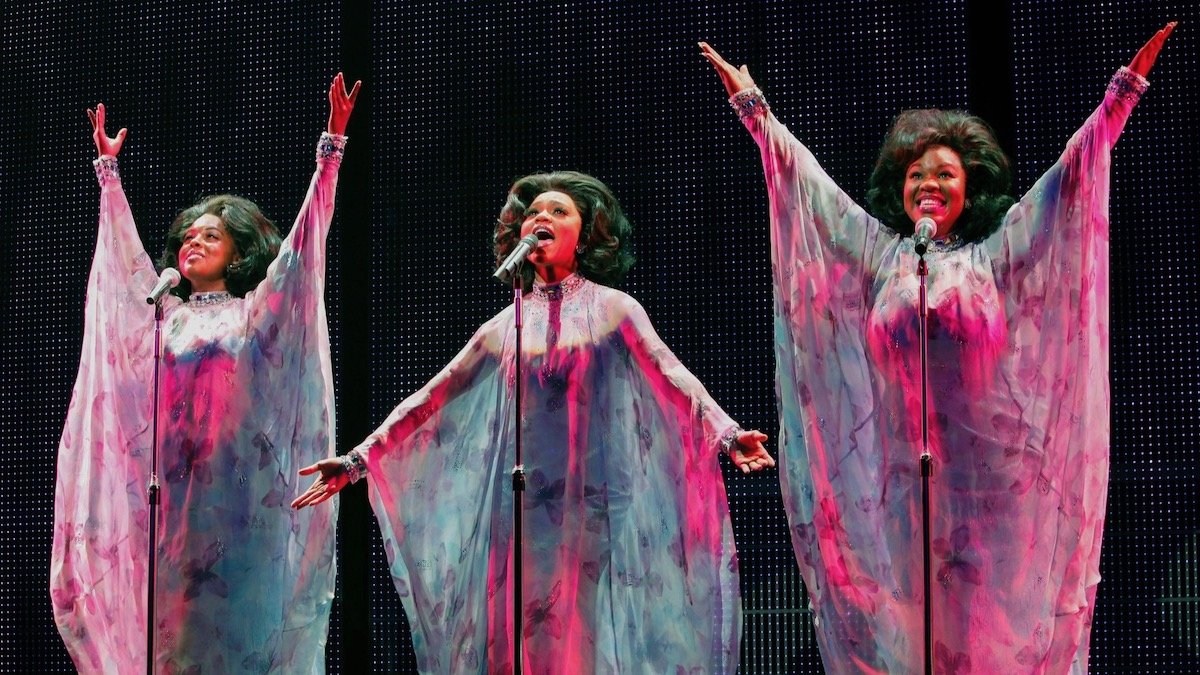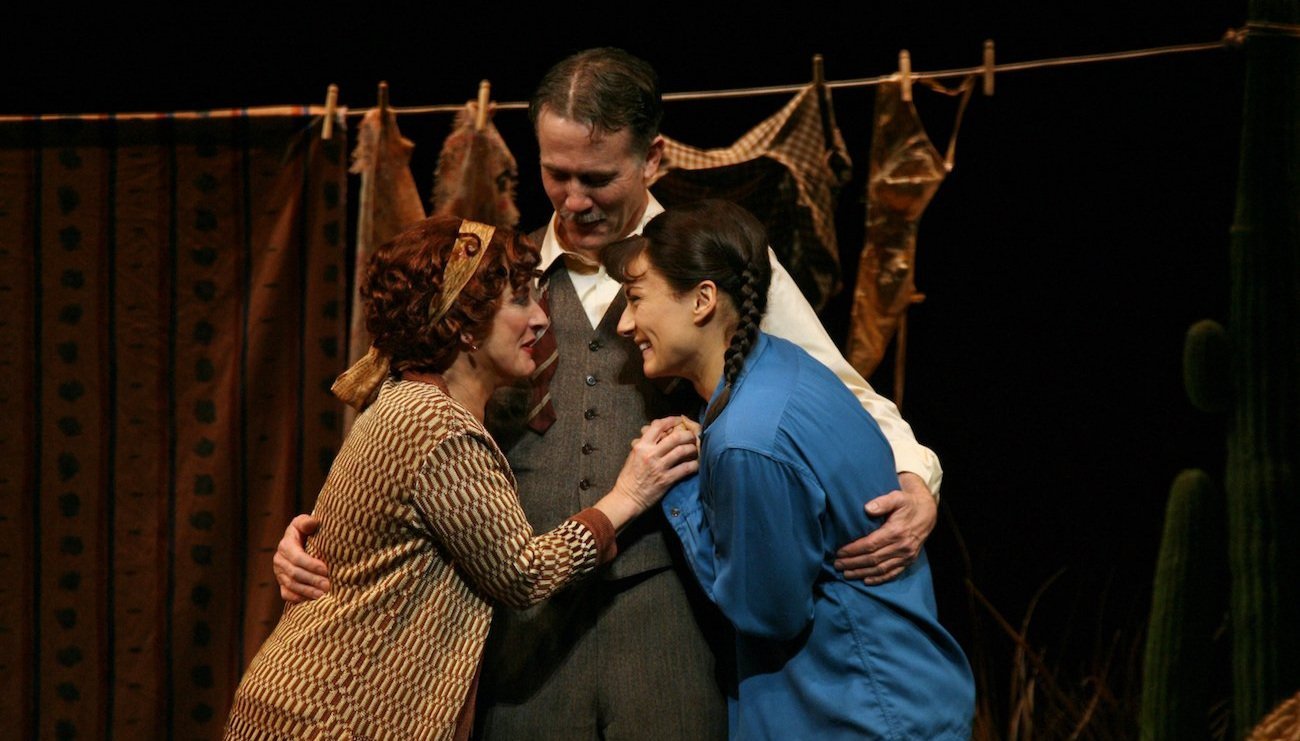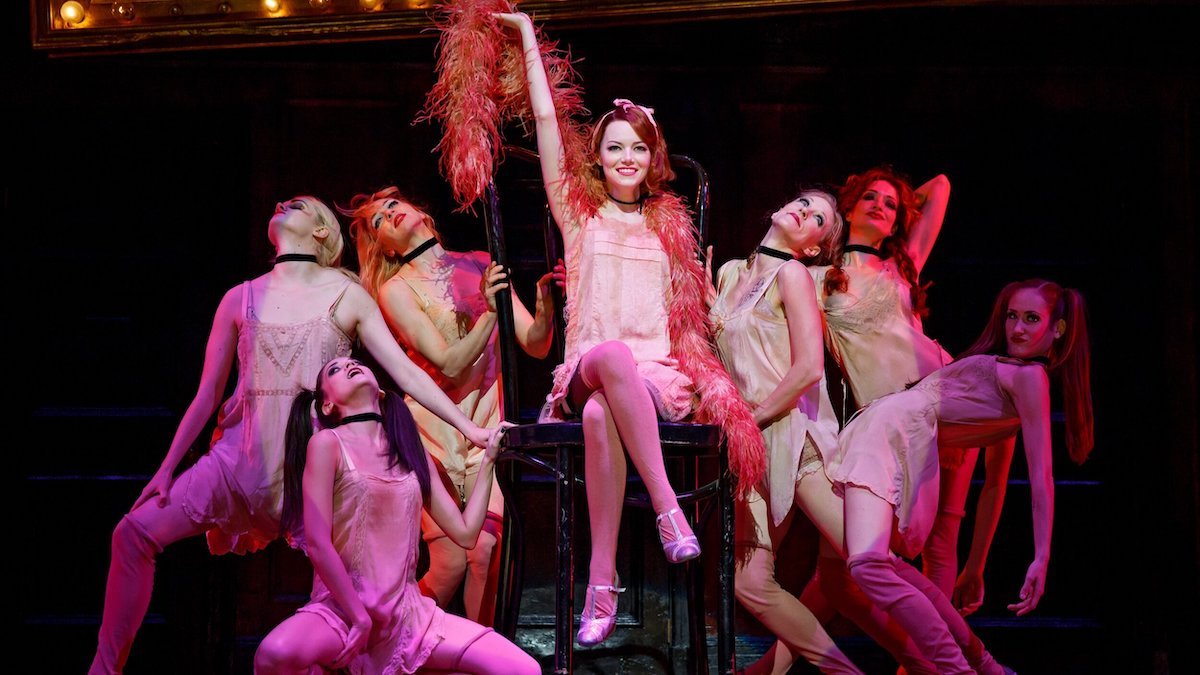
Here’s a curated list of Concord Theatricals musicals that began onstage and were later adapted into films.
Bye Bye Birdie
by Michael Stewart, Charles Strouse and Lee Adams (US/UK)
The stage musical (1960)
A loving send-up of the 1950s, small-town America, teenagers and rock & roll, Bye Bye Birdie remains as fresh and vibrant as ever. Teen heartthrob Conrad Birdie has been drafted, so he chooses All-American girl Kim MacAfee for a very public farewell kiss. The original Broadway production starred Dick Van Dyke, Chita Rivera and Paul Lynde, with Dick Gautier as rocker Conrad Birdie.
The film (1963)
Featuring box-office star Ann-Margret as Kim McAfee, the film adaptation of Bye Bye Birdie shifted the story’s focus from the adults to the teens. Dick van Dyke and Paul Lynde reprised their stage roles, but Janet Leigh – not known for her singing or dancing – took on Chita Rivera’s role of Rosie. With a substantially altered script and a slew of cut numbers, this film adaptation doesn’t properly reflect the magic of the stage musical. Stick with the stage version!
Cabaret
by Joe Masteroff, John Kander and Fred Ebb (US/UK)
The stage musical (1966)
In a Berlin nightclub, as the 1920s draw to a close, a garish Master of Ceremonies welcomes the audience and assures them they will forget all their troubles at the Cabaret. With the Emcee’s bawdy songs as wry commentary, Cabaret explores the dark, heady and tumultuous life of Berlin’s natives and expatriates as Germany slowly yields to the emerging Third Reich. Hal Prince’s original Broadway production featured a giant mirror, which reflected the audience, making them complicit in the hedonism and political apathy depicted onstage.
The film (1972)
Directed by the legendary Bob Fosse, the film adaptation of Cabaret was a critical and commercial smash, winning an astonishing 8 Academy Awards, including Best Director. The film holds the record for most Academy Awards won by a film that did not win the Academy Award for Best Picture (it lost to The Godfather). Starring Liza Minnelli, Joel Grey and Michael Caine, Cabaret retained many songs from the stage musical but substantially changed the show’s plot, using different stories from the stage musical’s source material, The Berlin Stories by Christopher Isherwood.
Carmen Jones
by Oscar Hammerstein II and Georges Bizet (US/UK)
The stage musical (1943)
Set in a Southern town during World War II, Oscar Hammerstein’s adaptation of Carmen captures the romance, passion and tragedy of Bizet’s melodic opera with a distinctly American flavor. Fickle and flirtatious, factory worker Carmen Jones runs off to Chicago with an army corporal named Joe, stealing him away from his fiancée. But Carmen loses interest in Joe when she meets Husky Miller, a prize fighter on his way to the top. The original Broadway production starred Muriel Smith, alternating with Muriel Rahn, in the title role and featured a cast of Black performers, most of whom were making their Broadway debut.
The film (1954)
Carmen Jones starred Dorothy Dandridge and Harry Belafonte, neither of whom sang in the operatic style required for the piece, so they were dubbed by opera singers Marilyn Horne and LeVern Hutcherson. Costar Pearl Bailey sang her own material, transposed to suit her voice. Director Otto Preminger knew the major studios wouldn’t finance a major motion picture featuring an all-Black cast, so he produced the film himself, working with the NAACP to ensure that the characters were fairly represented. The film, which Andrew Culver of The Guardian later called “laudable in its desire to showcase the talents of African American performers who were denied opportunities in Hollywood,” won the Golden Globe for Best Motion Picture – Musical or Comedy.
Chicago
by Fred Ebb, Bob Fosse and John Kander (US/UK)
The stage musical (1975)
In roaring-twenties Chicago, killer chorine Roxie Hart and merry murderess Velma Kelly vie for the spotlight and the headlines, ultimately joining forces in search of the “American Dream”: fame, fortune and acquittal. Staged by Bob Fosse, the original production starred Chita Rivera, Gwen Verdon and Jerry Orbach; the 1996 Broadway revival, which continues to run 25 years later, originally starred Bebe Neuwirth, Anne Reinking and James Naughton.
The film (2002)
Released 27 years after the musical’s Broadway debut, the film adaptation of Chicago was a critical and box office smash. Directed by Rob Marshall and starring Renée Zellweger, Catherine Zeta-Jones and Richard Gere, the film won six Academy Awards, the first musical to win the honor in 45 years.
2009 Broadway Production of Dreamgirls (Joan Marcus)
Dreamgirls
by Tom Eyen, Henry Krieger and Harold Wheeler (US/UK)
The stage musical (1981)
A sweeping and inspirational journey through 20th-century American pop music, Dreamgirls chronicles one Motown group’s rise from obscurity to superstardom. The original Broadway production, conceived and directed by A Chorus Line’s Michael Bennett, triumphed at the Tony Awards, winning six awards and astonishing audiences with an eight-minute live performance; Jennifer Holliday brought down the house with the show’s Act I closer, “And I Am Telling You (I’m Not Going).”
The film (2006)
Another example of a musical taking its time to get to Hollywood, Dreamgirls waited 25 years to journey from stage to screen. (At one point, Whitney Houston was considered for the role of Deena.) The film adaptation, starring Jennifer Hudson, Beyoncé and Anika Noni Rose, earned Jennifer Hudson an Oscar for Best Supporting Actress and brought critical acclaim to costar Eddie Murphy as Jimmy.
Everybody’s Talking About Jamie
by Tom MacRae and Dan Gillespie Sells (US/UK)
The stage musical (2017)
Jamie New is sixteen and lives on a council estate in Sheffield. Jamie doesn’t quite fit in, but supported by his brilliant, loving mum and surrounded by his friends, he overcomes prejudice, beats the bullies and steps out of the darkness into the spotlight. Inspired by the 2011 British television documentary Jamie: Drag Queen at 16, the stage musical premiered in Sheffield before transferring to the West End for a hugely successful run.
The film (2021)
Released in September 2021 to select US theatres and via worldwide streaming through Amazon Prime Video, the film adaptation of Jamie is a faithful adaptation of the exuberant stage hit. Helmed by first-time director Jonathan Butterell and starring newcomer Max Harwood, the film is a joyful, colorful coming-of-age story featuring notable dramatic turns from costars Sarah Lancashire and Richard E. Grant.
Evita
by Tim Rice and Andrew Lloyd Webber (US/UK)
The stage musical (1978)
Evita charts the young and ambitious Eva Peron’s meteoric rise to sainthood. Set in Argentina between 1934 and 1952, the Tony-winning musical follows Eva Duarte on her journey from poor illegitimate child to ambitious actress to, as wife of military leader-turned-president Juan Peron, the most powerful woman in Latin America, before her death from cancer at age 33. The demanding title role elevated Elaine Paige (in the West End) and Patti LuPone (on Broadway) to premier status as musical theatre royalty.
The film (1996)
Eighteen years in the making, the film adaptation of Evita passed from studio to studio, with its lead role attached to a host of great actresses, including Barbra Streisand, Elaine Paige, Liza Minnelli, Meryl Streep, Michelle Pfeiffer and Glenn Close. In the end, the role went to Madonna, opposite Antonio Banderas as Che, in a lush, opulent film directed by Alan Parker. Authors Tim Rice and Andrew Lloyd Webber reunited after ten years of work on other projects to collaborate on the song “You Must Love Me,” which earned them an Academy Award for Best Original Song.
Funny Girl
by Jule Styne, Bob Merrill and Isobel Lennart (US/UK)
The stage musical (1964)
With humor, talent and chutzpah, young Fanny Brice, an awkward Jewish girl who “isn’t pretty,” defies the odds and becomes one of the greatest stars of her generation. Fanny’s rise to superstardom and her turbulent romance with gambler Nick Arnstein are explored through Merrill and Styne’s unforgettable score, which includes “People” and “Don’t Rain On My Parade.” The show made a superstar of its leading lady, a relatively unknown 21-year-old performer named Barbra Streisand.
The film (1968)
A hit with critics and audiences, Funny Girl became the United States’ highest-grossing film of 1968 and earned eight Academy Award nominations. Reprising her stage role, Barbra Streisand became a global sensation, winning an Oscar for Best Actress (in a tie with Katharine Hepburn for The Lion in Winter). The film made songs like “People” and “Don’t Rain on My Parade” into international hits and cemented Streisand’s place at the top of the charts.
Grease
by Jim Jacobs and Warren Casey (US/UK)
The stage musical (1971)
Here is Rydell High’s senior class of 1959: duck-tailed, hot-rodding “Burger Palace Boys” and their gum-snapping, hip-shaking “Pink Ladies” in bobby sox and pedal pushers, evoking the look and sound of the 1950s. Head greaser Danny Zuko and new girl Sandy Dumbrowski try to relive the high romance of their “Summer Nights” as the rest of the gang sings and dances its way through songs capturing the sound of a generation. The original Broadway production ran an astounding 3,388 performances, setting a new record as Broadway’s longest-running show.
The film (1978)
One of the most successful film adaptations of a stage musical, Grease was an international sensation when it premiered in 1978. Starring John Travolta and Olivia Newton-John, the blockbuster movie was, at the time, the highest-grossing film ever made, surpassing the 13-year record held by The Sound of Music. Incorporating songs from the stage show along with some golden oldies and several new numbers, the film featured a mix of new faces and star cameos.
2008 Broadway production of Gypsy (Joan Marcus)
Gypsy
by Arthur Laurents, Jule Styne and Stephen Sondheim (US/UK)
The stage musical (1959)
Regarded by many theatre professionals as the finest musical ever created, Gypsy is the ultimate tale of an ambitious stage mother fighting for her daughters’ success while secretly yearning for her own. Arthur Laurents’ landmark show, based on the memoirs of legendary stripper Gypsy Rose Lee, explores the world of two-bit show business with brass, humor, heart and sophistication. The original Broadway production starred powerhouse Ethel Merman as “Mama” Rose, in a career-making performance for the ages.
The film (1962)
The 1962 film adaptation of Gypsy, directed by Mervyn LeRoy, starred box office draw Rosalind Russell, along with Natalie Wood and Karl Malden. Though Russell had sung in a Broadway musical before, in Leonard Bernstein’s Wonderful Town (US), some of her vocals were dubbed by singer Lisa Kirk. Natalie Wood, who had been dubbed by Marni Nixon in West Side Story, did her own singing here. Generally faithful to the stage version, the film has several brilliant highlights, including the hilarious “You Gotta Have a Gimmick.”
HAIR
by Gerome Ragni, James Rado and Galt MacDermot (US/UK)
The stage musical (1967)
The American tribal love rock musical Hair celebrates the sixties counterculture in all its barefoot, long-haired, bell-bottomed, beaded and fringed glory. The 1967 musical exploded onto the scene, shocking traditional audiences and thrilling a new generation of theatregoers. Exploring ideas of identity, community, global responsibility and peace, Hair remains relevant as ever as it examines what it means to be a young person in a changing world.
The film (1979)
Though the stage version of Hair is essentially a series of musical numbers loosely connected by the suggestion of a plot, the film adaptation, directed by Milos Forman, was more tightly and specifically scripted. Starring John Savage, Treat Williams, Beverly D’Angelo, Annie Golden, Dorsey Wright and Cheryl Barnes, the film featured cameos from Nell Carter and Melba Moore. Co-creators Gerome Ragni and James Rado were unhappy with the film adaptation, however; they felt it departed too greatly from their stage work and failed to connect the characters to the peace movement.
In the Heights
by Lin-Manuel Miranda and Quiara Alegria Hudes (US/UK)
The stage musical (2005)
In the Heights tells the universal story of a vibrant community in New York’s Washington Heights neighborhood – a place where the coffee from the corner bodega is light and sweet, the windows are always open and the breeze carries the rhythm of three generations of music. The original Broadway production won four Tony Awards, including Best Musical, and earned a Grammy for Best Musical Show Album, launching the meteoric career of creator and star Lin-Manuel Miranda.
The film (2021)
Directed by John M. Chu, the film adaptation of In the Heights is a vibrant, colorful, kinetic celebration of life in Manhattan’s neighborhood of Washington Heights. Starring Anthony Ramos in the role originated by Lin-Manuel Miranda, the film costars Corey Hawkins, Leslie Grace, Melissa Barrera, Daphne Rubin-Vega, Gregory Diaz IV and Jimmy Smits. Olga Merediz reprises her stage performance as Abuela Claudia and creator Lin-Manuel Miranda appears periodically as Piragua Guy. Postponed due to the COVID-19 pandemic, the film premiered in June 2021 in theaters and via streaming on HBO Max.
Jesus Christ Superstar
by Tim Rice and Andrew Lloyd Webber (US)
The stage musical (1971)
The first musical by Andrew Lloyd Webber and Tim Rice to be produced for the professional stage, Jesus Christ Superstar has wowed audiences for 50 years. The timeless rock opera follows the last week of Jesus Christ’s life as seen through the eyes of Judas Iscariot. Originally released in 1970 as a “concept album” the show premiered on Broadway in 1971 in a lavish production starring Ben Vereen, Jeff Fenholt and Yvonne Elliman. Broadway newcomer Andrew Lloyd Webber earned a Drama Desk Award as “Most Promising Composer.”
The film (1973)
The movie adaptation of Superstar, directed by Norman Jewison, starred Ted Neeley, Carl Anderson and Yvonne Elliman, all of whom had appeared in the Broadway production; all three leads earned a Golden Globe nomination. Filmed on location in Israel and other Middle Eastern locations, the film featured two songs not included on the original concept album: “Could We Start Again, Please?,” which was added for Broadway, and “Then We Are Decided,” which debuted in the film. Daring, gritty, spectacular and often bizarre, the film received widely mixed reviews, but it proved to be a box office hit – the highest-grossing musical in the US and Canada that year.
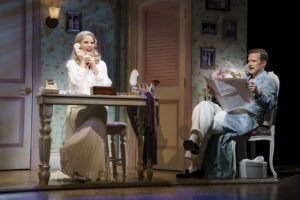
2019 Roundabout Theatre Company Production of Kiss Me, Kate (Joan Marcus)
Kiss of the Spider Woman
by Terrence McNally, John Kander, Fred Ebb and Manuel Puig (US/UK)
The stage musical (1993)
This celebrated Kander & Ebb musical, adapted from the novel by Manuel Puig, presents a harrowing tale of persecution juxtaposed against a dazzling spectacle of liberating fantasy. Cell mates in a Latin American prison, Valentín and Molina immediately clash. Valentín is a tough revolutionary enduring torture, and Molina is a flamboyant gay man serving eight years for deviant behavior. Over time, the men connect as Molina shares his fantasies about an actress, Aurora, who famously portrayed a glamorous “Spider Woman” who could kill with a kiss. The smash hit took home seven Tony Awards, including Best Musical, Best Book of a Musical and Best Original Score.
The film (2025)
Directed by Bill Condon, who wrote the screenplay for Chicago and wrote and directed the film adaptation of Dreamgirls, the film adaptation of Kiss of the Spider Woman premiered at the Sundance Film Festival on January 26, 2025. Starring Diego Luna as Valentín, newcomer Tonatiuh as Molina, and international superstar Jennifer Lopez as Aurora, the film includes musical numbers only in Aurora’s fantasy sequences, maintaining a stark, non-musical reality for the men’s experience in prison.
Kiss Me, Kate
by Cole Porter, Samuel Spewack and Bella Spewack (US/UK)
The stage musical (1948)
Passions run high as leading lady Lilli Vanessi and her ex-husband, actor/director Fred Graham, battle onstage and off in a production of Shakespeare’s Taming of the Shrew. With romance, comedy, sophistication and behind-the-scenes hijinks, Kiss Me, Kate combines the irreverent humor of four brilliant writers: Sam and Bella Spewack, Cole Porter and William Shakespeare. The original Broadway production, staring Alfred Drake, Patricia Morison, Lisa Kirk and Harold Lang. was the first winner of the Tony Award for Best Musical.
The film (1953)
The film Kiss Me Kate (written without a comma, unlike the stage title) was released in both 3-D and 2-D formats. Starring Kathryn Grayson, Howard Keel and Ann Miller, the movie retained nearly all the gems of Cole Porter’s sparkling score, though “Another Op’nin, Another Show” was, inexplicably, cut. “Too Darn Hot,” a huge production number in the stage show, became a star turn for dancer/singer Ann Miller. Despite many positive reviews, the film failed to recoup its investment, largely due to its enormous operating budget.
On A Clear Day You Can See Forever
by Alan Jay Lerner and Burton Lane (US/UK)
The stage musical (1965)
Alan Jay Lerner and Burton Lane’s groovy, kooky romantic comedy – about a therapist who falls in love with his patient’s persona from a past life – embraced some far-out mid-60s attitudes regarding ESP and past life regression. Starring the brilliant Barbara Harris, John Cullum and William Daniels, the show introduced several musical theatre standards, including the lush title song, “Come Back To Me,” “Hurry, It’s Lovely Up Here” and “What Did I Have That I Don’t Have?”
The film (1970)
After Funny Girl and Hello, Dolly!, Barbra Streisand rounded out her three-picture deal with Columbia Pictures by starring in On A Clear Day. Streisand’s hilarious, radiant performance in two widely divergent roles (Daisy and Melinda) makes this film adaptation a must-see. Though, in the stage show, the title song is sung only by the male lead, Streisand sings a reprise in the film; she released the track as a single and it became part of her concert repertoire for years.
On the Town
by Leonard Bernstein, Betty Comden, Adolph Green and Jerome Robins (US)
The stage musical (1944)
This energetic wartime musical about three sailors on a 24-hour leave in New York City features thrilling music by Leonard Bernstein with playful lyrics and book by Betty Comden and Adolph Green. Adapted from Jerome Robbins’ ballet Fancy Free, the show features a number of musical theatre standards, including “Come Up to My Place,” “I Can Cook, Too,” “Some Other Time” and “New York, New York.”
The film (1949)
Starring Gene Kelly, Frank Sinatra and Jules Munshin as the sailors, with Betty Garrett, Ann Miller and Vera-Ellen as their gals, On the Town was an instant critical and commercial hit. Though the score departed significantly from that of the stage musical, the film adaptation maintained the show’s magic, capturing the energy of New York in several scenes filmed on location throughout the city.
Pal Joey
by Richard Rodgers, Lorenz Hart and John O’Hara (US/UK)
The stage musical (1940)
The penultimate Rodgers & Hart collaboration introduced the first anti-hero to propel a musical. Joey may be an opportunistic cad, but he always seems to land on his feet. Directed by George Abbott and starring song-and-dance man Gene Kelly, the original Broadway production introduced two standards: “I Could Write a Book” and “Bewitched, Bothered and Bewildered.”
The film (1957)
Released 17 years after the show’s Broadway debut, the film adaptation of Pal Joey starred Hollywood’s top draw, Frank Sinatra. The film, loosely adapted from the stage musical, dispensed with several of the show’s songs and replaced them with other Rodgers & Hart standards, including “The Lady Is a Tramp” and “I Didn’t Know What Time It Was.”
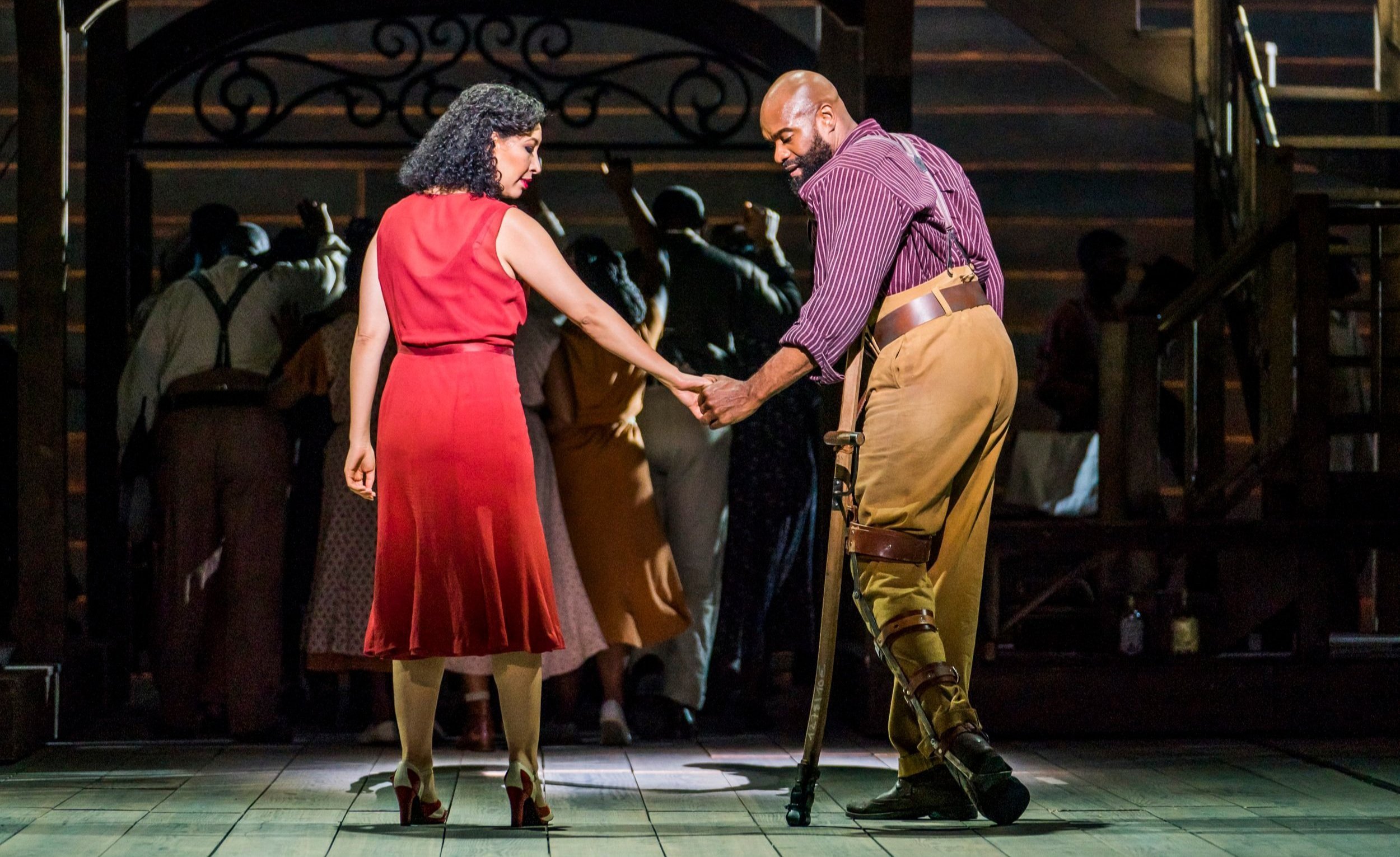
2018 English National Opera production of Porgy and Bess® (Tristram Kenton).
Porgy and Bess®
by George Gershwin, DuBose Heyward and Ira Gershwin (US/UK)
The stage musical (1935)
Recognized worldwide as a masterpiece and an “American Folk Opera,” Porgy and Bess was George Gershwin’s final work for the musical stage. Based on DuBose and Dorothy Heyward’s play Porgy, the musical combines elements of jazz, classical and American folk music in songs like “Summertime,” “My Man’s Gone Now,” and “I Got Plenty o’ Nuttin’.” Since its 1935 debut, Porgy and Bess has returned to Broadway an astonishing seven times, making it the most-revived show in Broadway history.
The film (1959)
Directed by Otto Preminger, and starring Sidney Poitier and Dorothy Dandridge, the visually rich Hollywood adaptation of Porgy and Bess also featured Sammy Davis, Jr., Pearl Bailey and Diahann Carroll. Screenwriter N. Richard Nash, author of The Rainmaker (US/UK), changed virtually all of the opera’s sung recitative to spoken dialogue to add a greater sense of realism. Though it was selected for preservation in the National Film Registry, Porgy and Bess is considered a “lost film”; it is not available on home video, and a high-quality film print may no longer exist.
Richard O’Brien’s The Rocky Horror Show
by Richard O’Brien (US/UK)
The stage musical (1973)
In this cult classic, sweethearts Brad and Janet, stuck with a flat tire during a storm, discover the eerie mansion of Dr. Frank-N-Furter. As their innocence is lost, Brad and Janet meet a houseful of wild characters, including a rocking biker and a creepy butler. Through elaborate dances and rock songs, Frank-N-Furter unveils his latest creation: a muscular man named “Rocky.” A long-running hit at London’s Royal Court Theatre (Upstairs), The Rocky Horror Show premiered on Broadway in 1975 and spawned productions all over the globe.
The film (1975)
Redubbed The Rocky Horror Picture Show, the film adaptation of the rock ‘n’ roll stage hit became a international cult sensation. Starring author Richard O’Brien along with Tim Curry, Susan Sarandon and Barry Bostwick, the film earned a reputation as a midnight movie when fans began interacting with the film at the Waverly Theater in New York’s West Village. More than 46 years after its debut, the film remains in limited release; it is the longest-running theatrical release in film history.
Rodgers & Hammerstein’s Oklahoma!
by Richard Rodgers and Oscar Hammerstein II (US/UK)
The stage musical (1943)
Rodgers & Hammerstein’s first collaboration set a new standard for modern musical theatre. Their ebullient musical comedy/romance, which embraced hope, determination and the promise of a new land, took Broadway by storm, running an astonishing (for its time) 2,212 performances. Featuring an integrated book and score, with narrative-advancing choreography from Agnes de Mille, Oklahoma! was more than OK with audiences and critics alike. Olin Downs of The New York Times called it “an integrated and indigenous form of American lyric theatre.”
The film (1955)
Released twelve years after the show’s Broadway opening, the film adaptation of Oklahoma! starred Gordon MacRae, Rod Steiger, Gloria Grahame and newcomer Shirley Jones, making her film debut. Shot primarily in Arizona (to avoid the ubiquitous oil wells in contemporary Oklahoma), the film remained largely faithful to the stage musical, earning another rave review from The New York Times.
Sweet Charity
by Neil Simon, Cy Coleman, Federico Fellini, Tullio Pinelli and Ennio Flaiano (US/UK)
The stage musical (1966)
Inspired by Federico Fellini’s Nights of Cabiria, Sweet Charity explores the turbulent love life of Charity Hope Valentine, a hopelessly romantic but comically unfortunate dance hall hostess in New York City. The tuneful, groovy, hilarious musical features several big hits, including “Big Spender,” “If My Friends Could See Me Now,” “I’m a Brass Band” and “Baby, Dream Your Dream.” The original Broadway production, starring Gwen Verdon, was conceived, directed and choreographed by her husband, Bob Fosse.
The film (1969)
Bob Fosse made his feature directorial debut with this film, which captures all the quirkiness, decadence and pizzazz of his signature style. Starring Shirley MacLaine in the title role, Sweet Charity was nominated for three Academy Awards. Though many critics found the film inferior to the stage musical (Vincent Canby of The New York Times criticized it for being “so enlarged and so inflated”) it does capture some of Fosse’s finest work, including the ultra-cool “Rich Man’s Froog.”
The Phantom of the Opera
by Andrew Lloyd Webber, Charles Hart, Richard Stilgoe and Gaston Leroux (US/UK)
The stage musical (1986)
Andrew Lloyd Webber’s lush, romantic musical tells the story of a masked figure who lurks beneath the catacombs of the Paris Opera House, exercising a reign of terror over all who inhabit it. The Broadway production was an instant smash, winning seven Tony Awards and thrilling critics and audiences alike. The musical, now a global sensation, remains Broadway’s all-time longest-running show.
The film (2004)
Directed by Joel Schumacher, the 2004 film adaptation of Phantom starred Gerard Butler, Emmy Rossum, Patrick Wilson, Miranda Richardson and Minnie Driver. Praised for its spectacle, the film received mixed reviews but succeeded at the box office, earning over $154 million worldwide. Composer Andrew Lloyd Webber was pleased with the adaptation, calling it “an extraordinarily fine document of the stage show.”
The Sound of Music
by Richard Rodgers, Oscar Hammerstein II, Howard Lindsay and Russel Crouse (US/UK)
The stage musical (1959)
Rodgers & Hammerstein’s final collaboration, based on the memoir of Maria Augusta Trapp, opened at the Lunt-Fontanne Theatre on November 16, 1959. With Broadway star Mary Martin in the leading role, the show was an instant success, enchanting audiences with its captivating story and a trove of infectious songs, including “Climb Ev’ry Mountain,” “My Favorite Things,” “Do-Re-Mi” and the title number. Nominated for eight Tony Awards, The Sound of Music won five, including Best Musical.
The film (1965)
Cherished all over the globe, The Sound of Music is arguably the world’s most beloved film musical. Starring Julie Andrews (fresh off the success of Mary Poppins) and featuring Christopher Plummer, Richard Haydn, Peggy Wood, Charmian Carr and Eleanor Parker, The Sound of Music won the hearts of audiences worldwide, earning five Oscars, including Best Picture.
The Wiz
by William F. Brown and Charlie Smalls (US/UK)
The stage musical (1974)
A beloved Broadway gem, The Wiz infuses L. Frank Baum’s The Wonderful Wizard of Oz with a dazzling mix of rock, gospel and soul music. The timeless tale of Dorothy’s adventures through the Land of Oz, reinvented for an all-Black cast in its Broadway premiere, starred newcomer Stephanie Mills, who wowed audiences with her rendition of the show’s signature song, “Home.” The Broadway production won a staggering seven Tony Awards, including Best Musical and Best Score.
The film (1978)
Loosely based on the stage musical, the big-screen adaptation of The Wiz starred some of Hollywood and Motown’s biggest names, including Diana Ross, Michael Jackson, Nipsey Russell, Lena Horne and Richard Pryor. Ted Ross (the Lion) and Mabel King (Evillene) reprised their stage roles. A commercial failure, the film failed to connect with audiences and critics, many of whom felt Ross was too old to play the teenage Dorothy. The 2015 NBC Live presentation, featuring 19-year-old Shanice Williams as Dorothy, better captured the energy of the stage show and met with critical acclaim, earning six Emmy nominations.
For more starry plays and musicals, visit Concord Theatricals in the US or UK.

Comedy Mysteries: Gasps, Laughs and Thrills

A Children’s Theatre Classic: An Interview with Snow White And The Seven Dwarfs Composer Michael Valenti


